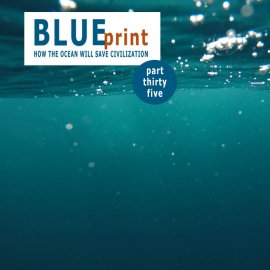The Ocean Genome, part 3
-
English
-
ListenPause
[intro music] Welcome to World Ocean Radio… I’m Peter Neill, Director of the World Ocean Observatory. We have been discussing the ocean genome, the compendium of genetic value embedded in ocean species and the water column itself. In past editions, we discussed the extant activity already present in the form of genomic research and commercial applications, as well as the emerging medicinal discoveries with powerful implication for the future of human health. In this discussion I am relying on a paper published in August 2020 in Nature Sustainability, an academic journal, with authors from the Stockholm Resilience Center and other university researchers from Japan, South Africa, the US and UK. The critical issue, as always, is between overt, unsustainable commercial applications and public benefit sustainable over time to preserve the ongoing benefits of the ocean genome for future generations. It is a conflict that has characterized behavior on land, now introduced in the sea with predictable outcomes not always equitably distributed. And, again, solution cries out for public awareness, national and international regulation, and governance instruments and bodies to address the problem, negotiate agreements, establish protocols, and engage or invent new bodies to address the issues not previously seen as part of the problem. One complication is that these instruments typically focus on the physical form of genetic resources rather than including more intangible international aspects such as genetic sequencing and synthesis, data bases for the protection of existing and predictive information, exclusivity of use by patent and proprietary expropriation, and irresponsible exploitation of information in the public domain. This scientific advance dramatically escalates potential benefit, just as it does potential abuse, and the global community is only just now coming to grips with the need for protections. What might those be? One approach requires operative national and trans-national legal measures and incentives. A sustainable future for these ocean resources must include: a) building knowledge of the ocean genome and increasing government and philanthropic support for research and risk assessment; b) management structures for protection of marine genetic diversity; c) inclusion of ocean genome conservation in all research and commercial initiatives; d) allocation of grants and subsidies to high and low-income nations to assist and assure inclusion; e) building capacity in marine science, information sharing, and distribution of policy, plans, and programs; and f) promotion of research within the ethical context of sustainability, social outcome, and international cooperation. An equally essential approach is to designate where such measures and incentives should be applied. The question here is also familiar: how do we protect natural resources, as contained within the entirety of the ocean genome, outside areas of national jurisdiction, the 64% of the ocean to include open water, the seabed, and the water column? In the language of ocean policy, this question is articulated by the opposition of phrases: on the one hand, “freedom of the high seas,” implying liberal access and the absence of benefit sharing, and on the other hand, “the common heritage of all mankind,” implying equitable sharing across all geographical and social elements worldwide. This debate has morphed from theoretical to confrontational, and the tension can be felt and seen in the politics of security, fisheries, natural resource extraction, and climate. The governance structures and agreements in place today are inadequate to the need. Negotiations are intense, and fraught with external and internal politics. There are efforts to address the over-arching issues in the high seas: sharing of research and information, area-based management schemes including marine protected areas, environmental impact assessments, transfer of marine technology, and the sharing of monetary and non-monetary benefits as capital return. My personal opinion calls for an international declaration for change, a manifesto and radical plan for the governance of the ocean as a world commons, an inter-connected, protected zone beyond the limits of any and all national jurisdictions, as a context for every decision made within national waters and coastwise territory, as a legal framework that controls access and utility in relation to its value as proposed and permitted by application of real ecosystem service analysis, taking into account the true profit and loss by any party in relation to defined sustainable outcomes. As every structure and behavior on land ultimately descends to and affects the world hydraulic system on which climate depends, as every human action, every capital endeavor, has a downstream reaction and effect, thus everything we do to provide the security of biodiversity, thus life, depends on that reality with that value planned, financed, implemented, and adjudicated accordingly. Any action in contradiction to this fundamental operating principle diminishes the outcome and imperils us all. We will discuss these issues, and more, in future editions of World Ocean Radio. [outro music]
This week on World Ocean Radio: part thirty-five of the multi-part BLUEprint series. This week, as part of our focus on new approaches and ideas to simplify our strategies for living sustainably on earth, we are continuing our discussion of the ocean genome with an outline of the global protections required if we are to equitably protect natural resources derived from the ocean.

The "BLUEprint Series: How the Ocean Will Save Civilization" outlines a new and sustainable path forward, with the ocean leading the way.
About World Ocean Radio
Since 2009, a weekly 5-minute podcast covering a broad spectrum of ocean issues from science and education to advocacy and exemplary projects. World Ocean Radio, a project of the World Ocean Observatory, is available for syndicated use at no cost by college and community radio stations worldwide. Contact [email protected] if you are interested in becoming an affiliate or know of a radio station that should be broadcasting these episodes each week.
Listen to " The Ocean Genome, part 2" here
Listen to " The Ocean Genome, part 1" here
Photo by Jeremy Bishop on Unsplash
- Login to post comments



